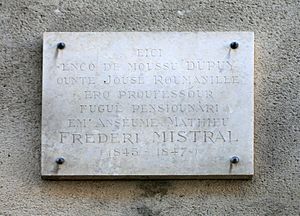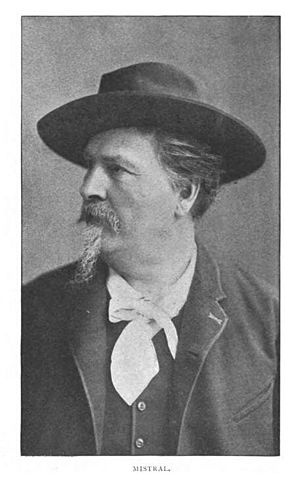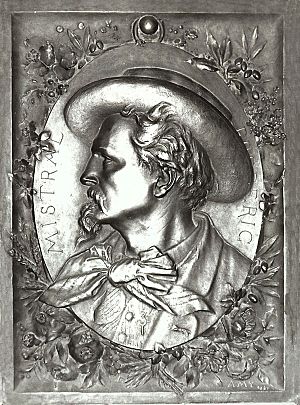Frédéric Mistral facts for kids
Quick facts for kids
Frédéric Mistral
|
|
|---|---|
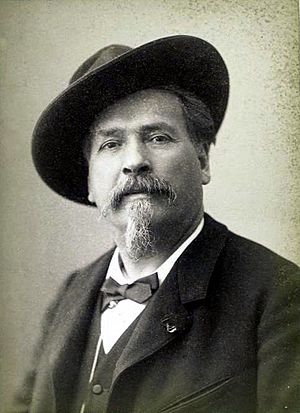 |
|
| Born | Joseph Étienne Frédéric Mistral 8 September 1830 Maillane, France |
| Died | 25 March 1914 (aged 83) Maillane, France |
| Occupation | Poet |
| Nationality | French |
| Alma mater | Aix-Marseille University |
| Notable awards | Nobel Prize in Literature 1904 |
| Signature | |
Frédéric Mistral (born Joseph Étienne Frédéric Mistral, September 8, 1830 – March 25, 1914) was a famous French writer. He wrote in the Occitan language, especially the Provençal dialect. He was also a lexicographer, which means he created dictionaries.
In 1904, he won the Nobel Prize in Literature. He received this award because his poems were very original and inspiring. They showed the beautiful nature and spirit of the people in his home region, Provence. He also did important work as a language expert for the Provençal language.
Mistral helped start a group called the Félibrige. This group worked to promote the Occitan language and culture. He was also a member of the Académie de Marseille, a respected group of scholars.
His name in his own language was Frederi Mistral. His fame grew thanks to other famous writers like Alphonse de Lamartine and Alphonse Daudet, who praised his work.
Frédéric Mistral's Life Story
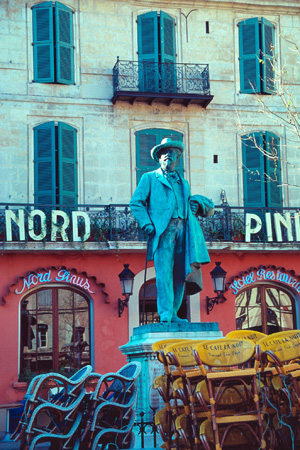
Frédéric Mistral was born in a village called Maillane in southern France. His parents were wealthy farmers. His family had lived in the area for many generations.
He started school a bit later than most kids, around age nine. He sometimes skipped school, so his parents sent him to a boarding school.
After finishing high school, Mistral studied law at a university in Aix-en-Provence from 1848 to 1851. During this time, he became very passionate about Provence. He wanted to bring back the "first literary language of civilized Europe," which was Provençal.
Mistral believed that people who share a language, a place, and a history are connected. He decided to dedicate his life to bringing back the spirit of Provence. He wanted to do this by restoring its natural language and inspiring people with his poetry.
For all his hard work, Frédéric Mistral received the 1904 Nobel Prize for Literature. He shared the prize money with another writer, José Echegaray. Mistral used his half of the money to create a museum in Arles. This museum, called "Museon Arlaten," shows important collections of Provençal folk art, like old furniture, clothes, and tools.
Mistral also received the Légion d'honneur, a very special award in France. This was unusual because his work focused on Provence, not the whole country.
In 1876, Mistral married Marie-Louise Rivière. They did not have any children. He passed away on March 25, 1914, in Maillane, the same village where he was born.
The Félibrige Movement
On May 21, 1854, Mistral and six other Provençal poets started a group called Félibrige. One of these poets was his former teacher, Joseph Roumanille. This group was created to promote the Occitan language and culture.
The seven founders were Jóusè Roumaniho, Frederi Mistral, Teodor Aubanel, Ansèume Matiéu, Jan Brunet, Anfos Tavan, and Paul Giera. The Félibrige group still exists today.
Mistral worked hard to bring the Provençal language back to life. He wanted to make it a language for great poetry. He created a dictionary and wrote down the songs of old poets called troubadours. This helped to define the language in its purest form.
Creating the Lou Tresor dóu Felibrige Dictionary
Mistral wrote a huge dictionary called Lou Tresor dóu Félibrige (1878–1886). This is still the most complete dictionary of the Occitan language. It is very reliable because its definitions are so precise.
This dictionary is bilingual, meaning it has both Occitan and French words. It includes all the different dialects of Occitan, including Provençal.
Mirèio – Mistral's Famous Poem
Mistral's most important work is Mirèio (Mireille). He spent eight years writing it, and it was published in 1859. Mirèio is a long poem in Provençal with twelve songs.
The poem tells the story of Vincent and Mireille, two young people from Provence who fall in love. But their families are from different social backgrounds, so their love faces many challenges. The name Mireille means "wonder" in Provençal.
Through this poem, Mistral not only promoted his language but also shared the culture of Provence. He included stories about places like Saintes-Maries-de-la-Mer and the famous ancient statue, the Venus of Arles.
In the story, Mireille's parents want her to marry a wealthy landowner. But she loves Vincent, a poor basket maker. After turning down three rich suitors, Mireille becomes desperate. Her parents refuse to let her marry Vincent. So, she runs off to Saintes-Maries-de-la-Mer to pray for help. Sadly, she forgets her hat and gets sick from the heat. She dies in Vincent's arms, with her parents watching.
Mistral dedicated his book to Alphonse de Lamartine, another famous writer. Lamartine was very impressed and called the poem a "masterpiece."
Mirèio was translated into about fifteen different languages. Mistral even translated it into French himself. In 1863, a composer named Charles Gounod turned it into an opera called Mireille.
Wise Words from Mistral
Here are some famous quotes by Frédéric Mistral:
- « Les arbres aux racines profondes sont ceux qui montent haut. »
- "Trees with deep roots grow tall."
- « Les cinq doigts de la main ne sont pas tous égaux. »
- "The five fingers of the hand are not all equal."
- « Quand le Bon Dieu en vient à douter du monde, il se rappelle qu'il a créé la Provence. »
- "When the Good Lord begins to doubt the world, he remembers that he created Provence."
- « Chaque année, le rossignol revêt des plumes neuves, mais il garde sa chanson. »
- "Each year, the nightingale dresses with new feathers, but it keeps the same song."
- « Le soleil semble se coucher dans un verre de Tavel aux tons rubis irisés de topaze. Mais c'est pour mieux se lever dans les cœurs. »
- "The sun appears to set with iridescent ruby tones of topaz in a glass of Tavel. But it is to rise stronger in the hearts."
- « La Provence chante, le Languedoc combat »
- "Provence sings, Languedoc fights"
- « Qui a vu Paris et pas Cassis, n'a rien vu. (Qu'a vist París e non Cassís a ren vist.) »
- "He who has seen Paris and not Cassis has seen nothing."
Frédéric Mistral's Works
- Mirèio (1859) - PDF (in Provençal)
- Calendau (1867) - online
- Lis Isclo d’or (1875) - en ligne : part I, part II
- Nerto, short story (1884) - online
- La Rèino Jano, drama (1890) - en ligne
- Lou Pouèmo dóu Rose (1897) - online
- Moun espelido, Memòri e Raconte (Mes mémoires) (1906) - online
- Discours e dicho (1906) - online
- La Genèsi, traducho en prouvençau (1910) - online
- Lis óulivado (1912) - online
- Lou Tresor dóu Felibrige ou Dictionnaire provençal-français embrassant les divers dialectes de la langue d'oc moderne (1878–1886) - online
- Proso d’Armana (posthume) (1926, 1927, 1930) - online
- Coupo Santo (1867)
See also
 In Spanish: Frédéric Mistral para niños
In Spanish: Frédéric Mistral para niños
- The works of Antonin Mercié
- List of works by Louis Botinelly
 | John T. Biggers |
 | Thomas Blackshear |
 | Mark Bradford |
 | Beverly Buchanan |


